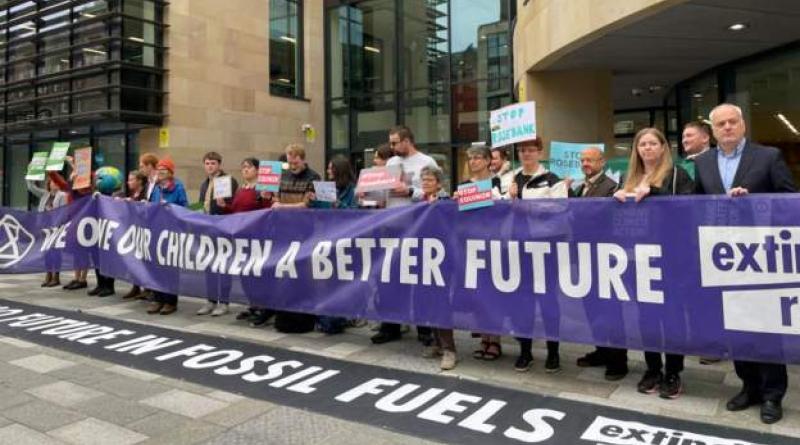Sunak hails Rosebank oil approval in face of climate outcry

Will producing oil and gas in the UK mean lower emissions?
The Energy Security and Net Zero Secretary Claire Coutinho has defended the Rosebank oil field, claiming that “overall it means lower emissions”.
The government is referring to what’s known as the production phase - the greenhouse gases emitted from producing oil and gas.
UK production phase emissions are around 75% lower than the global average for gas and around 25% lower for oil, according to a 2022 report by the Climate Change Committee, the government’s independent advisers.
However, a more recent report by the North Sea Transition Authority (NSTA), the UK’s oil and gas regulator, suggested the UK’s carbon intensity - the amount of carbon dioxide emitted per barrel of oil - was similar to the global average for production.
And oil and gas from Norway - the main source of imports for the UK - is considerably cleaner.
Equinor, the majority owner of Rosebank, has said that it will reduce emissions by electrifying its oil production- but that won’t be in place to begin with.
And of course, the greenhouse gas emissions from oil are mainly from burning it, not via production.
Critics note that more UK production just adds to the global stock of oil and gas, releasing more emissions in total.
What's been happening?
We'll soon be ending this live coverage. Before we leave you, here are the key things to know after the UK's largest untapped oil field, Rosebank, was approved for development by regulators.
- Prime Minister Rishi Sunak welcomed the news, saying it was the "right long-term decision" for UK energy security, and that it "makes sense" for the UK to use its own fuels
- But there was strong criticism from opposition MPs and environmental groups opposed to the production of more fossil fuels, which contribute to climate change when they are burned
- Green MP Caroline Lucas called the move "morally obscene", the Scottish Greens said the government was "wrecking our future", and broadcaster Chris Packham called it an "act of war against life on Earth"
- Opponents point out that the oil drilled from Rosebank will be exported and sold at world market prices - so won't cut prices for UK consumers
- But Energy Secretary Claire Coutinho argues that "much" of it will return to the UK after it's been refined in Europe and this will reduce reliance on foreign suppliers
- It's estimated that the field 80 miles (130km) west of Shetland could produce 300 million barrels of oil. But for that to happen, some 200 million tonnes of carbon dioxide could be emitted, a cross-party group of Westminster MPs has previously warned
- Announcing their decision, regulators said net zero considerations were taken into account - referring to the UK's legal obligations to reduce emissions before the year 2050 in an effort to combat climate change
- Investors in the oil field say 1,600 jobs will be created as part of the project
- Labour leader Sir Keir Starmer said his party would not revoke the drilling licence for Rosebank if it won the next general election but no new licences would be granted
Green co-leader puts Labour on the spot
Green Party co-leader Carla Denyer earlier said that by giving the go-ahead to the Rosebank oil field, the government was “choosing to make the climate emergency worse”.
But Denyer also turned the spotlight onto the main opposition party, writing in a post on X, formerly known as Twitter, that Labour could pledge to stop the project.
"If they confirm now that they’d rescind the drilling license in government, funding would dry up and the project would become unviable. Will they do it?" Denyer wrote.
Labour had opposed the plans for the oil field on cost and climate grounds, but has now said that while it would not grant new licenses if in government, it would also not revoke the licenses already granted.
How many jobs will the Rosebank oil field create?
Despite oil and gas output in the North Sea having declined over the last 20 years, the industry is still a big contributor to the economy - it employs over 200,000 people.
Today's news means more jobs will be created.
The government says that the site will generate a £6.3bn investment into British companies who have been contracted to help build it.
Equinor hold a majority stake in Rosebank and will be putting in £3.1bn alongside Ithaca Energy to develop the field.
Ithaca - which holds a 20% stake in this project - says it will support 1,600 jobs during construction, and that it will support around 450 UK based jobs during the field's lifetime.
Rosebank is expected to be able to produce around 300 million barrels of oil.
Output of oil and gas is expected to generate around £50bn in tax revenues over the next five years, the government says.
Production on the field is expected to begin in 2026/27.
Announcment shows how far behind energy transition is - SNP MP
The SNP political reaction to today's news about Rosebank can be a little confusing with First Minister Humza Yousaf and former leader Nicola Sturgeon speaking against the decision, but some in the party backing new oil and gas licenses.
Dave Doogan MP, the SNP's energy spokesperson, told BBC Lunchtime Live his reaction is "complicated".
He agrees with his boss that the decision is "disappointing", however he declines to say he is opposing Rosebank because of the impact that would have on jobs in his Angus constituency.
He says the announcement demonstrates how "far behind" the UK's transition to green energy is.
"We wouldn't be in this situation of licensing a whole array of new oil fields in the North Sea if the government had a serious commitment at a UK level to match the commitment that the Scottish government have had in the just transition."
"In the UK we are not transitioning fast enough and that's for want of investment by the United Kingdom government."
How much has the energy windfall tax raised?
Taxes from UK oil and gas production rose to £9bn in the year to March 2023 (up from £1.4bn the previous year), according to government statistics published today.
A third of that rise was as a result of the Energy Profits Levy (£2.6 billion) - also known as the windfall tax.
Almost all of the rest was corporation tax on the higher profits that oil and gas producers saw last year.
Read more: What is the windfall tax on oil and gas companies?
Is the world on target in tackling climate change?
It's worth having a look at the wider picture behind the controversy over the Rosebank oil field.
Earlier we looked at why there's so much talk about limiting global temperature rises to 1.5C in order to avoid the worst impacts of climate change.
In a landmark agreement signed in Paris in 2015, almost 200 countries pledged to try to keep global warming to 1.5C.
But are we on track? The anwer is no, as the graph below shows. Under current policies the planet is heading for 2.5C to 2.9C of warming, though if countries manage to stick to the pledges and targets they have made, this narrows to around 2C.
Just last week, UN Secretary-General Antonio Guterres said time was running out for countries to limit global temperature increases - due to the "naked greed" of fossil fuel interests.
Read more: A really simple guide to climate change
Why is oil and gas production falling in the North Sea?
The amount of UK oil and gas extracted from the North Sea has been steadily falling in recent years.
In 2000, North Sea oil and gas production was 246 million tonnes of oil equivalent (Mtoe), according to the North Sea Transition Authority, the UK oil and gas body.
Ten years later this had almost halved to 124 Mtoe. In 2022, oil and gas production was less than 80 Mtoe and this decline is expected to continue in the coming years.
So what’s behind the fall?
It’s largely because oil and gas supplies in the North Sea are dwindling, making it harder and more costly to extract new oil and gas.
By 2050, demand for oil and gas is also expected to fall to around a quarter of its current level if the UK reaches net zero greenhouse gas emissions - for example as heating and transport become electric.
That’s according to the government’s independent advisers, the Climate Change Committee (CCC).
In fact, even without new oil and gas projects, if the UK reaches net zero it would have to import half as much oil and gas in 2050 compared with today.
For these reasons, the best way to lower bills for customers and boost energy security would be to cut fossil fuel use and invest in renewables, according to the CCC and the environmental think tanks Green Alliance and the Energy and Climate Intelligence Unit.
Mixed reaction from the people of Orkney
The Rosebank oil field is 80 miles west of Shetland. Oil and gas have long been a crucial staple of the economy there, and also for Orkney to the south.
Our reporter Huw Williams took to the streets of Kirkwall in Orkney to find out what people there think about the go ahead for development and production at Rosebank.
Stewart McPhee from Stenness says: "I think that it would be a good thing for Orkney, a very good thing, because it will bring a lot of people in."
But Susan Tyzack from Twatt argues that most of the oil should be kept in the ground and "we should maintain a plan towards a green economy".
Jacqui Holmes from Lyness in Hoy also disagrees with the Rosebank oil and gas field going ahead and warns "it is money that just gets thrown away", arguing it should be put towards developing wind and solar power instead.
"I would be quite happy for it to go ahead," Tom King from Kirkwall tells our reporter, but adds that if the oil and gas are going to be taken away abroad in tankers "it's no big deal for Scotland at all".
Fiona McGuigan from Kirkwall backs the plans: "We still need oil until we have a replacement so I think they should go ahead with the oil development."
Fiona McGuigan from Kirkwall backs the plans: "We still need oil until we have a replacement so I think they should go ahead with the oil development."
How much oil is there in Rosebank?
The lead company Equinor estimates that about 300 million barrels of oil can be extracted from Rosebank over two phases, starting in 2026-7.
It puts the capacity at about 70,000 barrels per day, which would be about 10% of the UK’s current daily production, our colleagues at BBC Verify have calculated.
At that rate it would take about 12 years to extract the recoverable oil, although other groups have made higher estimates of the amount of oil that could be found.
Earlier on this page, we reported that the oil field was expected to produce about 500 million barrels of oil - a figure that was based on an older estimate from Equinor.
What about other potential environmental impacts?
To extract oil and gas from a facility like this, a series of wells are drilled into the seabed and then the products extracted to a ship moored to the seabed. This offloads the oil onto big ships called tankers, while the gas is sent down a pipeline.
The drilling and anchoring of the ship, as well as chemicals released, have the potential to disturb the seabed and damage habitats - and potentially kill animals living there such as soft corals and sea spiders.
There is also a lot of noise produced underwater when oil is extracted. This is important because many species in the marine environment use sound to communicate.
There are a number of laws such as The Conservation of Offshore Marine Habitats which ensure damage is minimised and where possible avoided. The regulator will have looked at how rare the species in this environment are and the area of seafloor disturbed before approval.
The biggest environmental impact would come from any accidental spill. The worst marine oil spill in history was in 2010 in the Gulf of Mexico from a BP site. The incident spilt four million barrels of oil over nearly three months. BP was required to pay up to $8.8bn (£7.25bn) for damages to the natural environment.
Such spills are rare - the frequency of a blowout of a well at the site is estimated at less than 0.0004%.
'We need to avert climate crisis immediately'
In Edinburgh, a group of protesters who oppose the Rosebank development have gathered outside UK government offices.
Juliet Dunstone called for a "just transition", saying "we need to prioritise people who are working in oil and gas - we need to get them green jobs and out of these polluting jobs that they’re stuck in.
"We need to avert the climate crisis immediately or millions of people will die."
Another protester, Bryce Goodall, said he was incensed with anger at the decision.
He told BBC Scotland News: "We’re absolutely outraged that this has been decided in the midst of a cost of living crisis.
"This oilfield is not going to do anything to lower energy bills or provide energy security."
A number of Scottish Green MSPs were also among the protesters.
Will Rosebank mean lower energy bills in the UK?
Oil and gas from UK waters is not necessarily used domestically - it is sold on global markets.
What Rosebank produces will be sold at world market prices, so the project will not cut energy prices for UK consumers.
The Norwegian state oil company Equinor - which is the majority owner of Rosebank - confirmed that.
"If the UK needs Rosebank oil, it will go to the UK through open market mechanisms", said Arne Gurtner, Equinor's senior vice president for the UK.
The long-term solution for UK bills and energy security "is in reducing our gas demand", rather then extracting new fossil fuels, Energy UK's chief executive said.
The government's independent advisers on climate change, the Climate Change Committee (CCC), made similar comments in response to plans to develop the UK's remaining offshore oil and gas reserves.
Last year, it wrote to the then-chancellor, Kwasi Kwarteng, saying more domestic oil and gas extraction would have "at most, a marginal effect on prices".
If you'd like to bit more background on the key questions around the Rosebank oil field, you can read our explainer here.
How will the oilfield affect the UK's net zero plans?
Opponents of Rosebank say developing the oilfield will make the government’s legally binding target to reach net zero harder to meet.
Net zero means countries are no longer adding to the total amount of greenhouse gases in the atmosphere.
The oil field is reckoned to contain up to 300m barrels of oil. Burn the lot and you would produce 200m tonnes of carbon dioxide, a group of 50 MPs from the major parties warned in August.
“This is more than the combined annual CO2 emissions of all 28 low-income countries in the world”, the MPs said.
The International Energy Agency (IEA), which advises governments on energy policy, says no big projects like Rosebank are needed because demand for fossil fuels is falling towards 2050.
But the government is adamant that it will meet its climate targets and allow the field to be developed.
It points out that net zero does allow for some oil and gas to be used so long as the emissions are offset by savings made elsewhere - for example by planting more trees or taking CO2 from the atmosphere and storing it permanently underground.
It estimates that a quarter of all UK energy will still be produced from oil and gas in 2050 on the basis of figures from its independent climate advisers, the Climate Change Committee.
The CCC would not comment on the accuracy of that estimate today.
Energy security is about the product being where it's needed - Equinor
We've now heard a bit more from Equinor, one of the main stakeholders in the Rosebank oil development.
Country manager Alex Grant has insisted the project will improve the UK's energy security.
"Energy security is about the product being there when it's needed, and not having arbitrary political situations turn it off for non-economic reasons. If the UK needs the oil, Rosebank will come to the UK," he told BBC Radio 4's World at One programme.
He rejected claims that the process of digging for untapped oil will cause the UK to exceed its carbon budget by 10%.
But he acknowledged that it does "take a lot of energy to take oil out of the ground" and the electrification process, which would make it less carbon-intensive, "won't happen for some time".
But he argued that if Rosebank is not developed, the same amount of oil will continue to be used in the UK but "we will import it from somewhere else, where the emissions will be likely over double the emissions of Rosebank".
"The environment doesn't care which country the emissions come from," Grant adds.
Why does limiting global warming to 1.5C matter?
When it comes to decisions that affect efforts to tackle climate change, we hear a lot about the need to limit the amount of warming to 1.5C - but what does that mean?
The world is now about 1.1C warmer than it was in the late 19th Century, before the Industrial Revolution - when humans started burning large amounts of fossil fuels.
It might not sound like much, but it has already led to:
- more frequent and intense extreme weather, such as heatwaves, drought and floods
- rapid melting of glaciers and ice sheets, contributing to sea level rise
- huge declines in Arctic sea ice
- ocean warming and marine heatwaves
Scientists say limiting temperature rise to 1.5C is crucial to avoid the most dangerous impacts of climate change - although these increase with every extra increment of warming.
The 1.5C warming limit was partly designed to avoid crossing so-called "tipping points".
These are thresholds beyond which changes could accelerate and become irreversible in different parts of the Earth's climate system, such as the collapse of the Greenland Ice Sheet.
But it's not clear precisely where these thresholds sit. Some may have already been crossed; some may be further away than first thought.
Read more: A really simple guide to climate change
How much is 200m tonnes of carbon dioxide?
In August, a cross-party group of MPs and peers urged the government to block the Rosebank oil field, citing the levels of greenhouse gases that would be emitted.
The exact emissions are difficult to forecast because it depends on how much oil is ultimately produced,and how much carbon dioxide (CO2) is produced per barrel of oil.
The cross-party group said Rosebank could produce 200m tonnes of CO2 over the lifetime of the oil field.
"This is more than the combined annual CO2 emissions of all 28 low-income countries in the world," they added.
In 2022, UK greenhouse gas emissions were 417.1m tonnes of CO2 equivalent, according to provisional figures.
This figure only refers to emissions within the UK. It excludes international aviation and shipping, and does not account for the UK’s total carbon footprint, which is higher.
So, using these numbers, the total emissions from Rosebank would equate to about half of the UK’s 2022 emissions.
Of course, the UK’s emissions need to fall hugely from the 2022 level, in order to reach its net zero goals.
Rosebank oil will 'come back to UK' - energy secretary
The UK’s Energy Security Secretary Claire Coutinho said that today’s announcement is “good for energy security” in the UK.
She had praised the decision earlier today, but we've now heard a bit more detail from her.
Speaking at lunchtime, Coutinho asserted that the gas extracted from Rosebank will be used domestically, while the oil will be exported initially but "much" of it will return to the UK after it is processed in Europe.
She said if the UK just relies on foreign imports of oil, it relies on foreign regimes and instead argued that "it's really important that this all goes to the European market and comes back once it's refined."
"It's good for energy security. It's good for jobs and investment in this country and overall it means lower emissions."
Asked if the real winners of today's announcement are the Norwegians, Coutinho asserted that the “real winners are people here in this country” - those who work in oil and gas, but also the entire British public who will "have better energy security".





